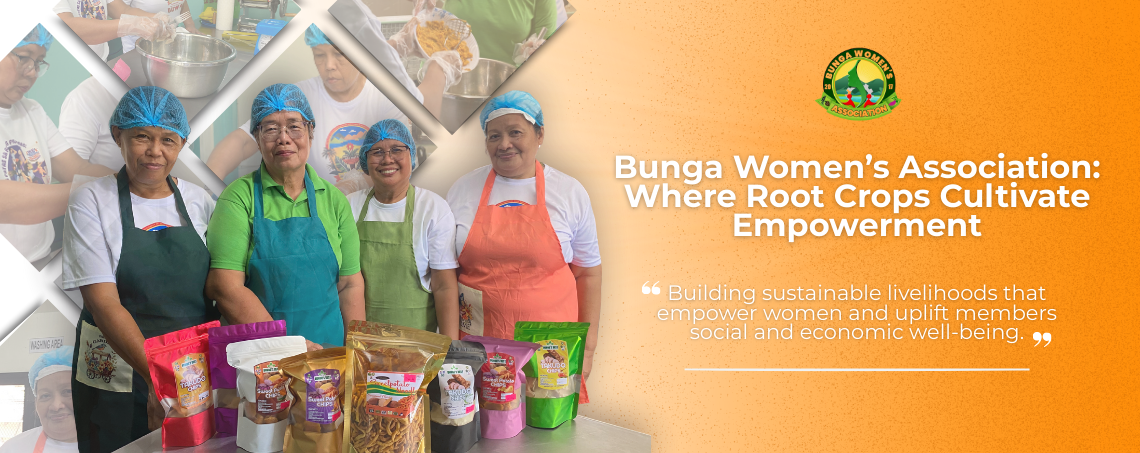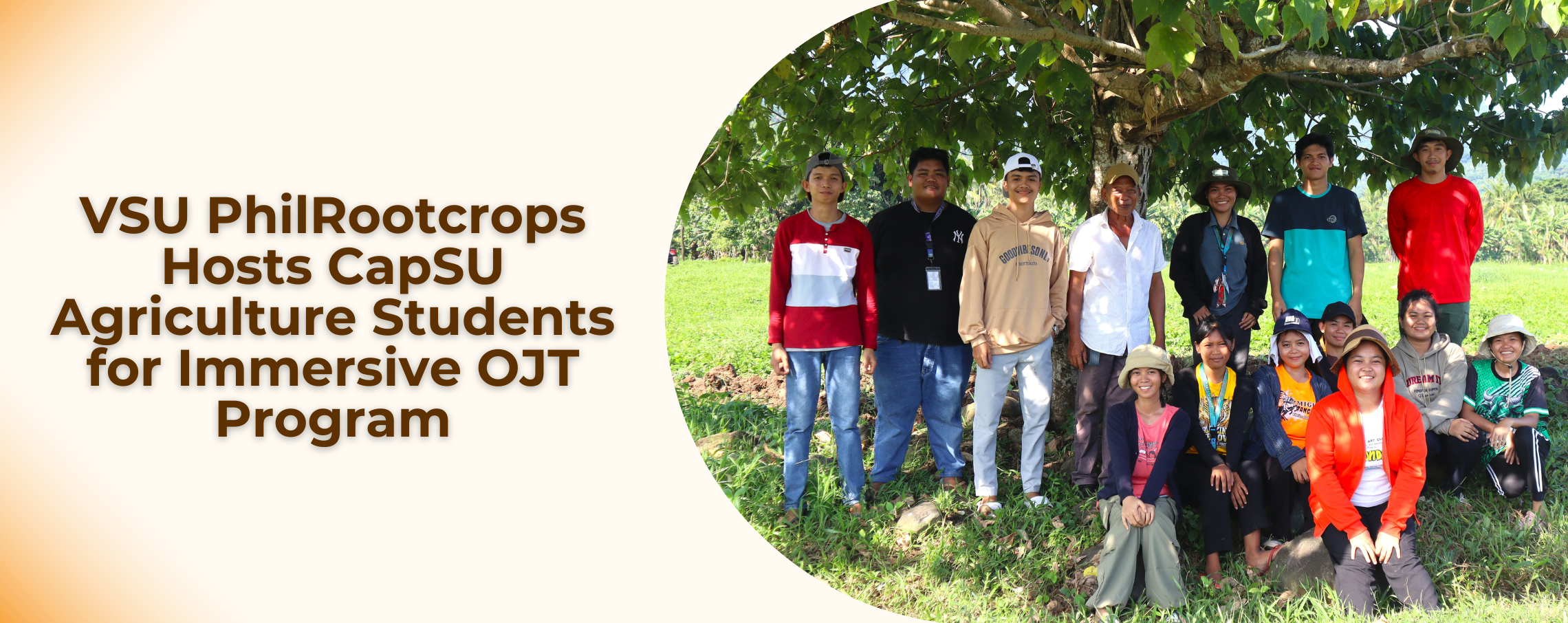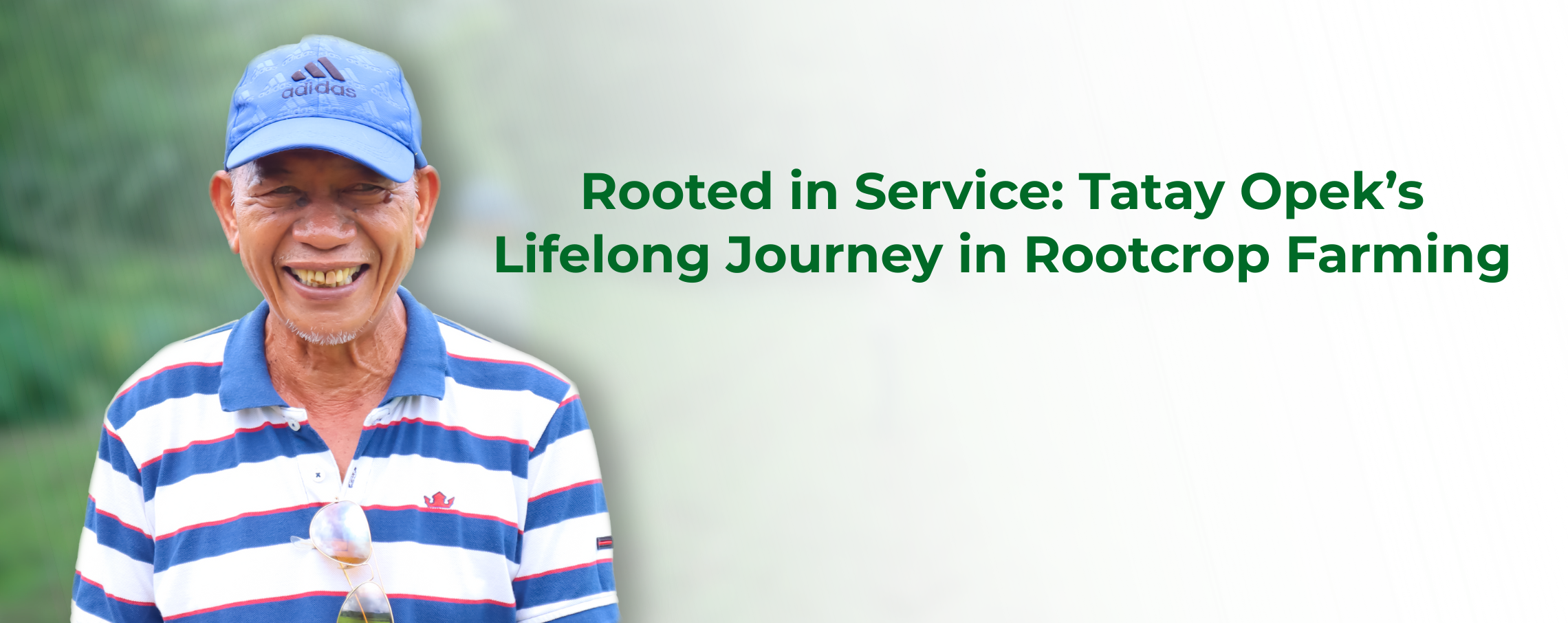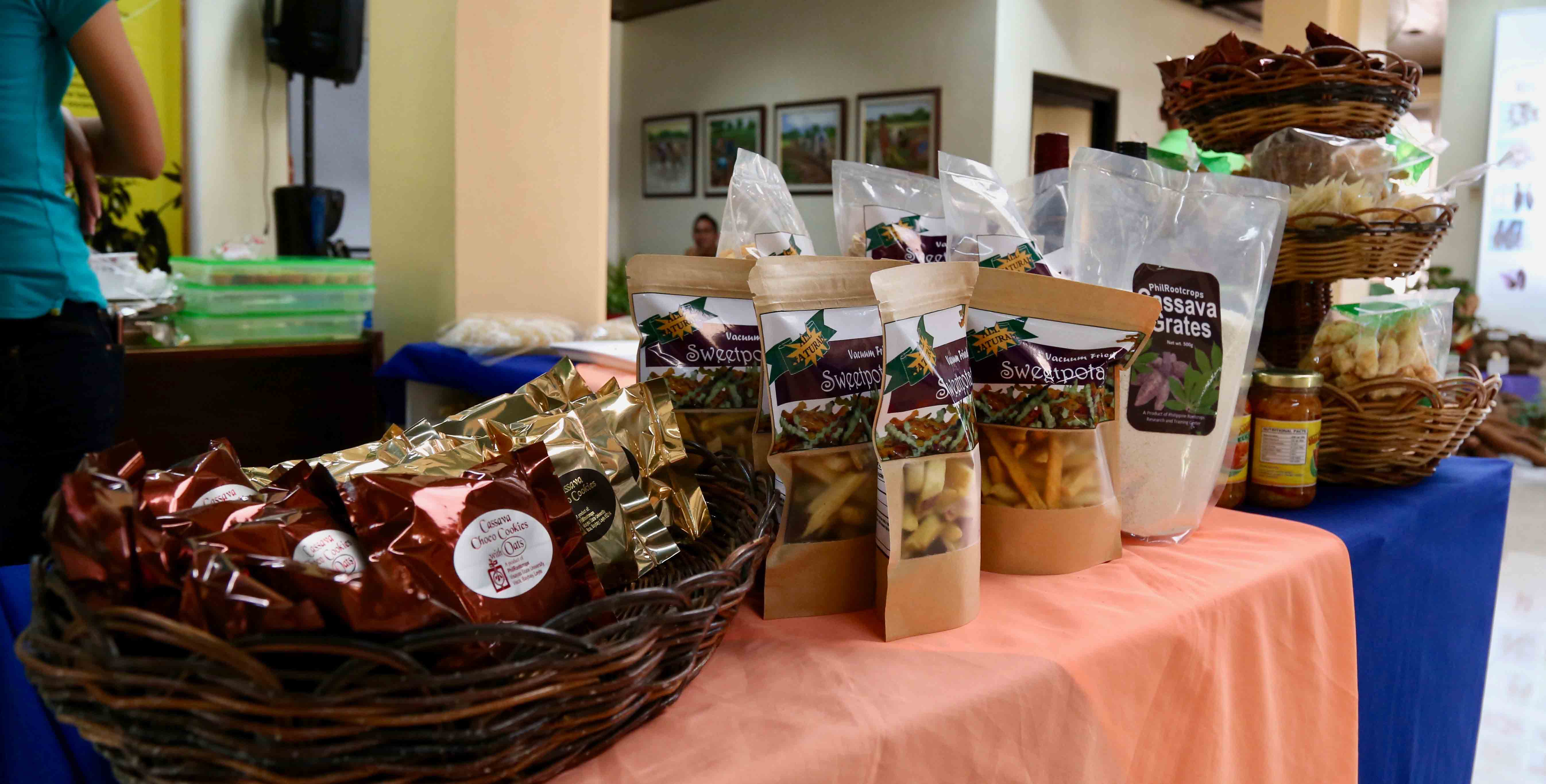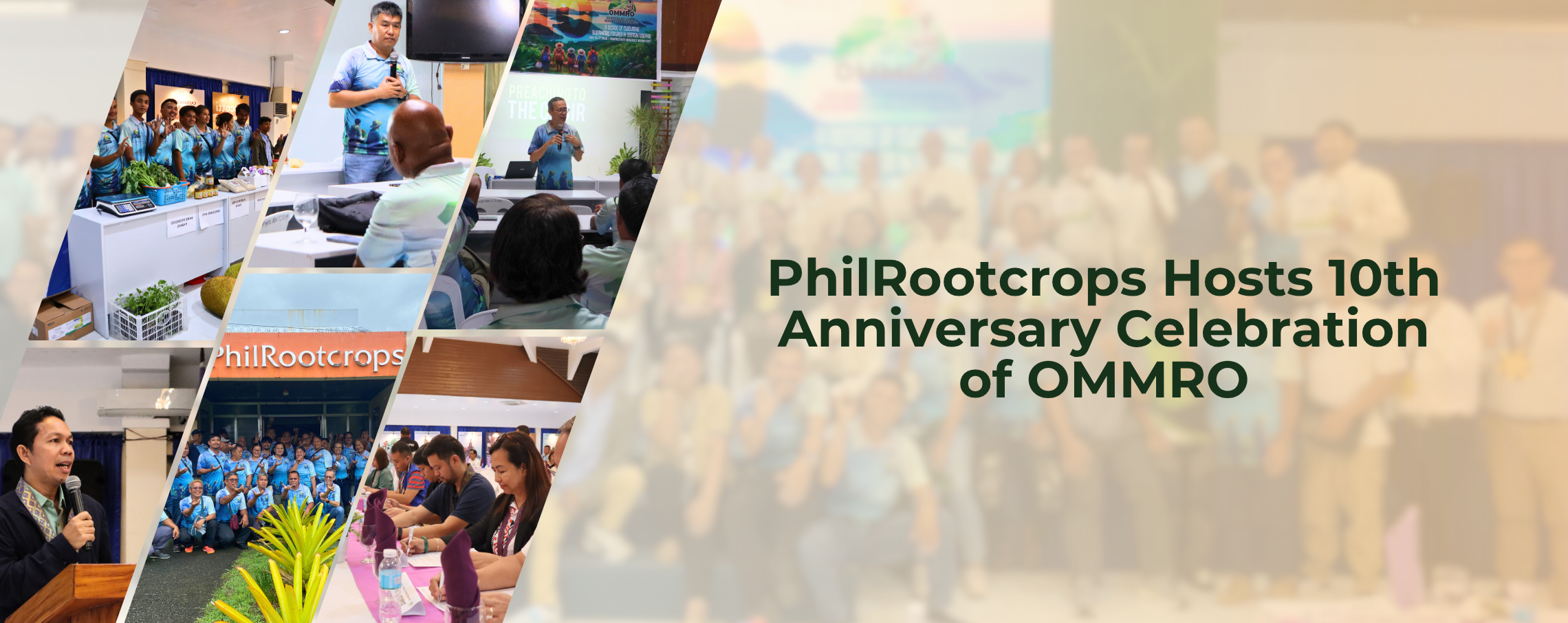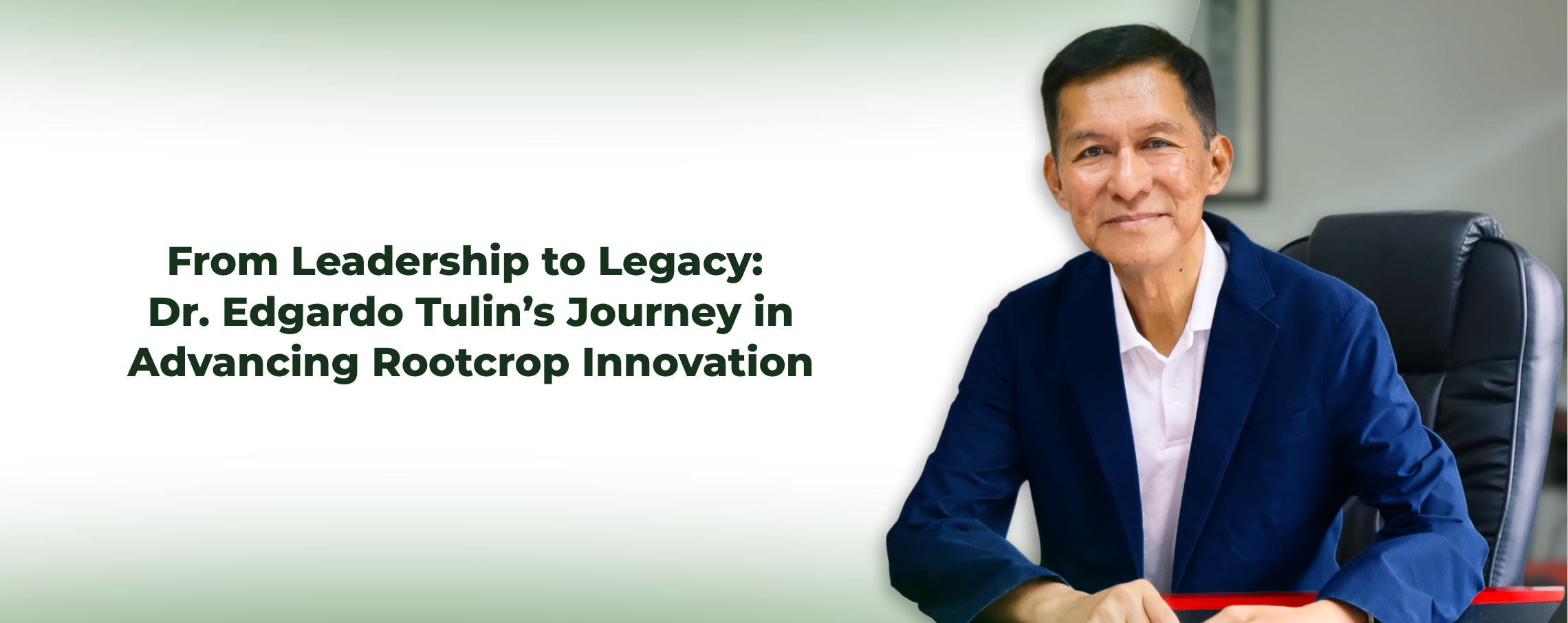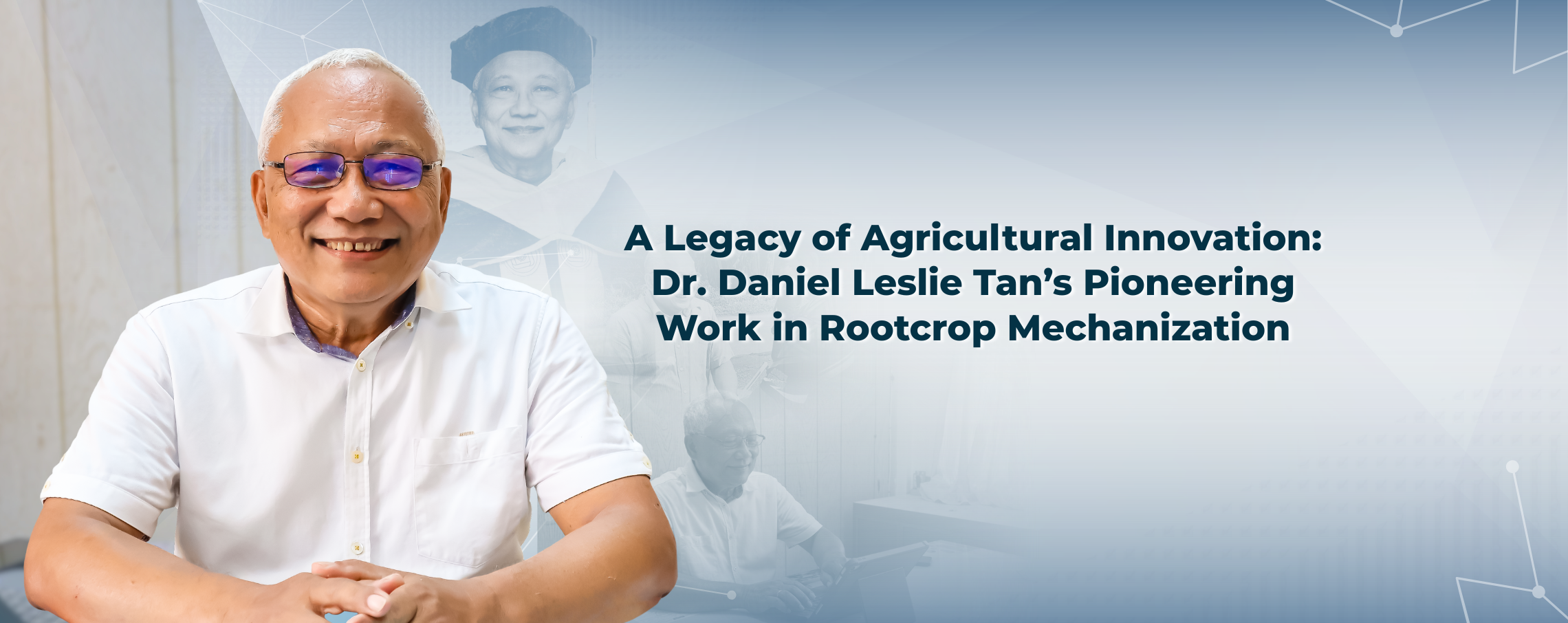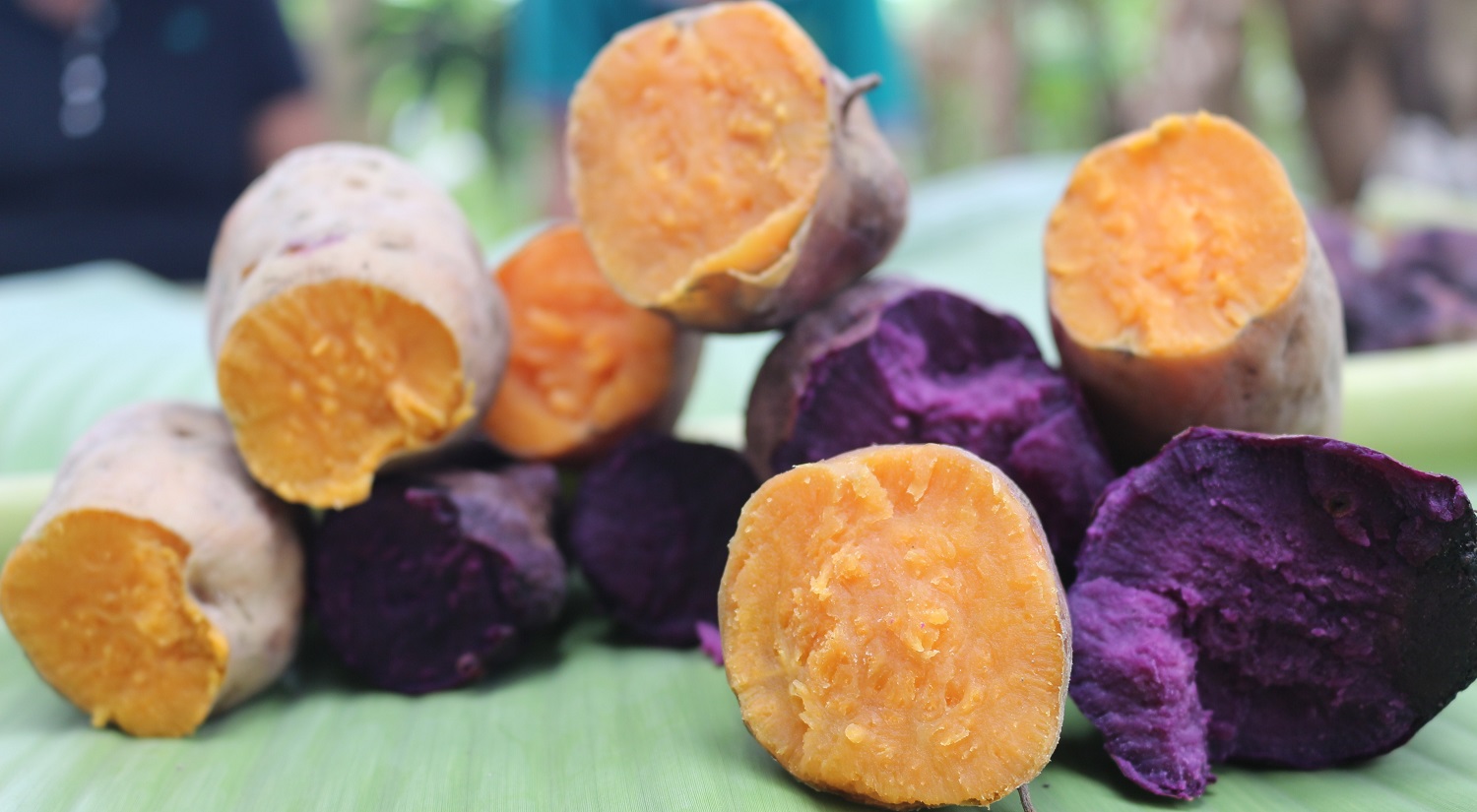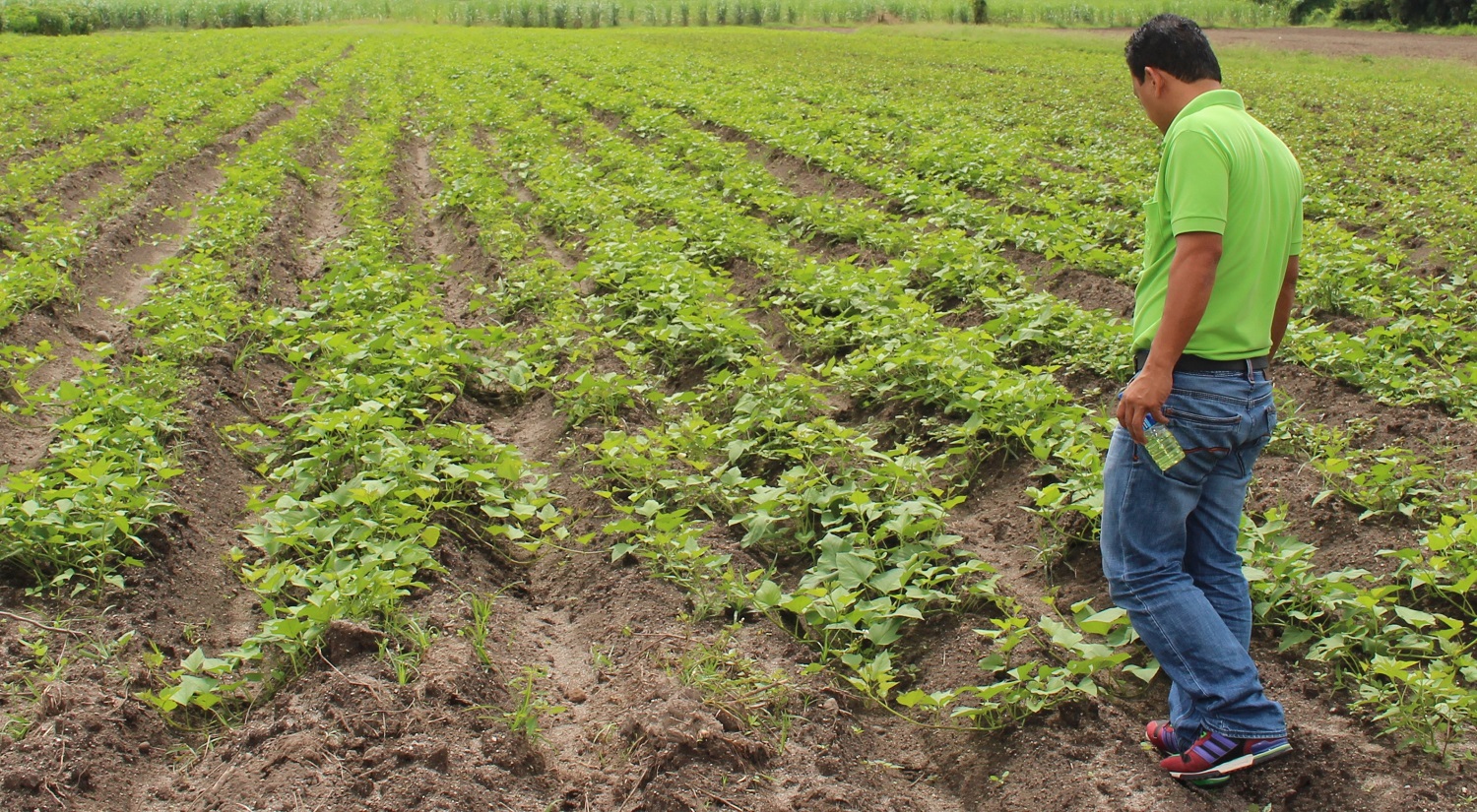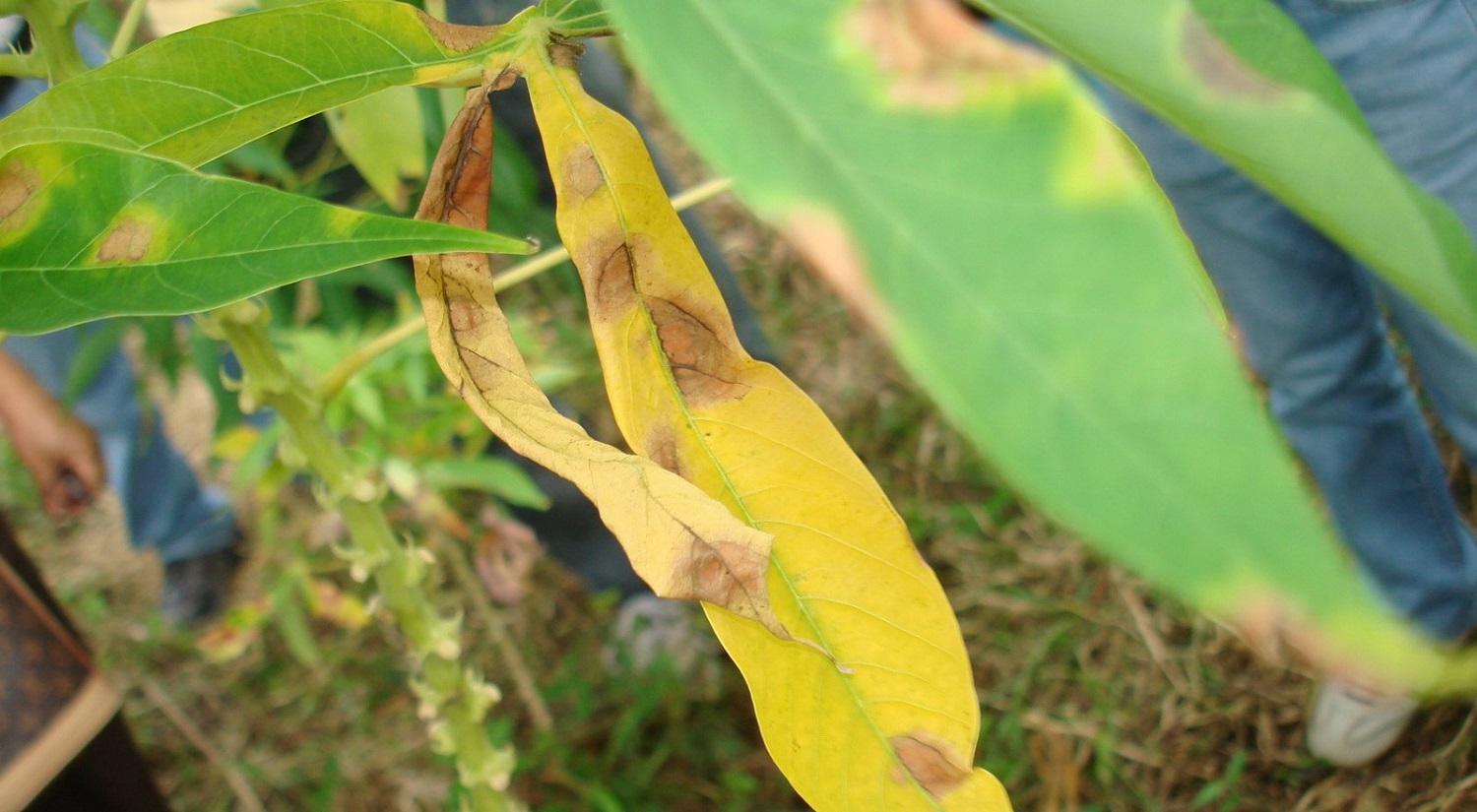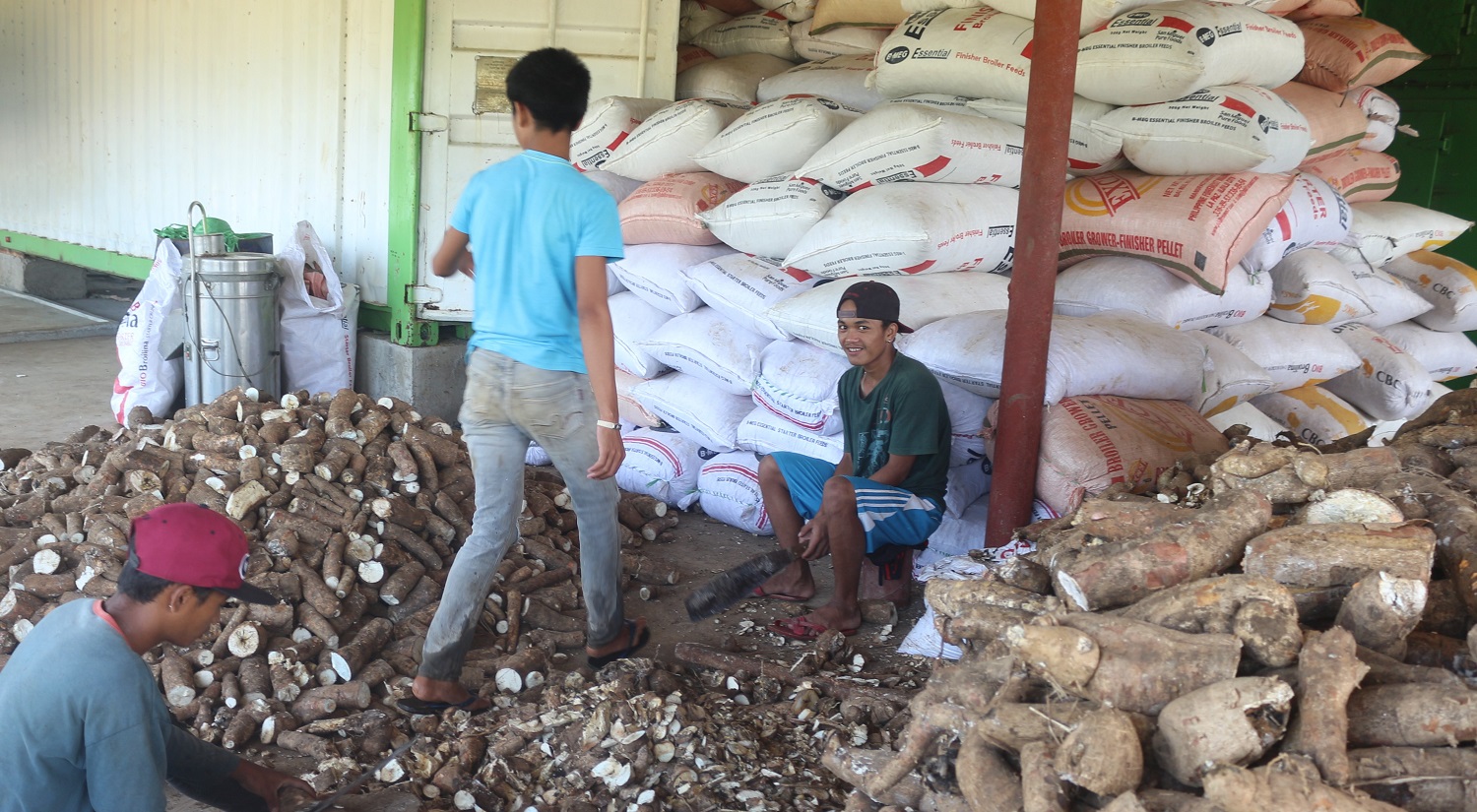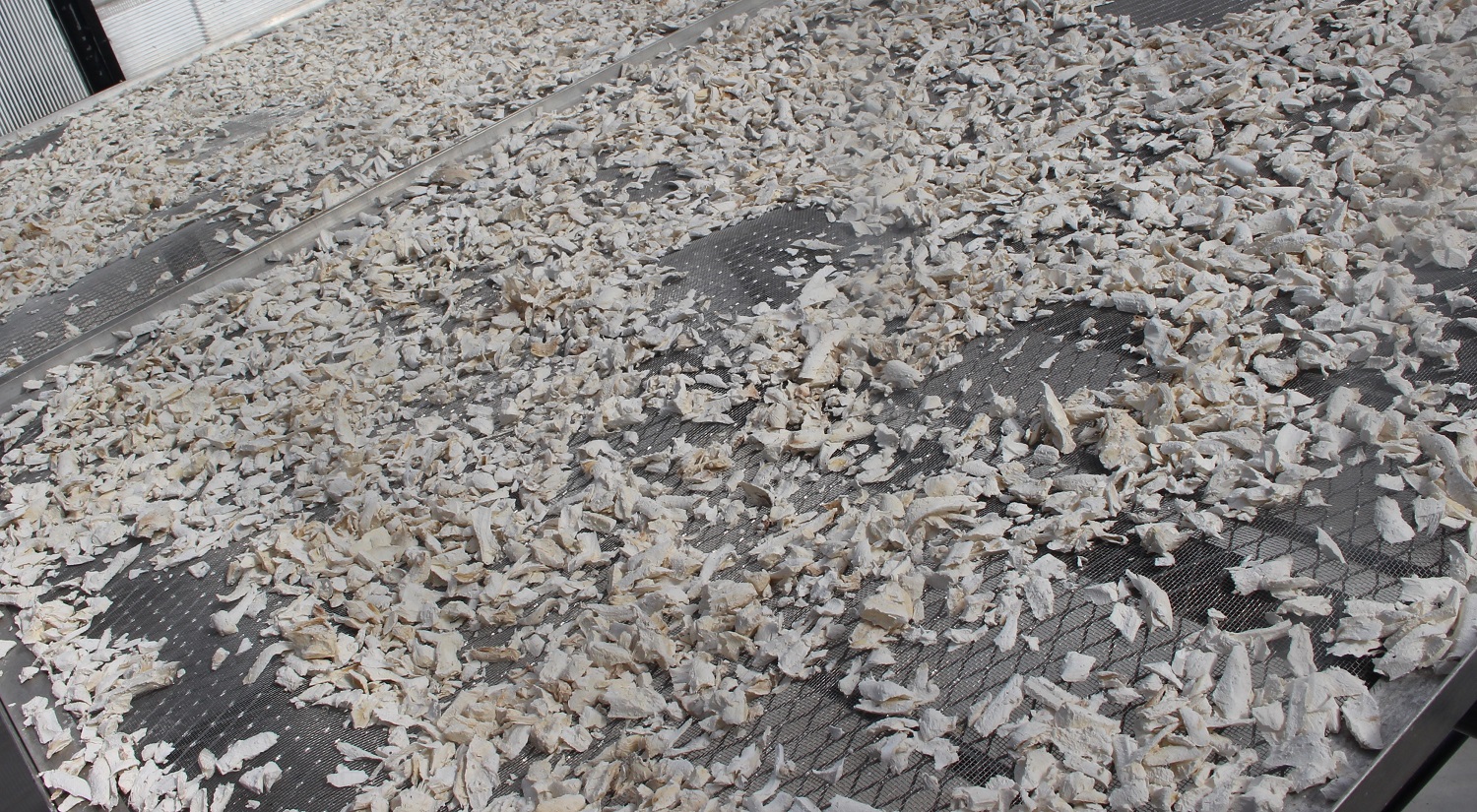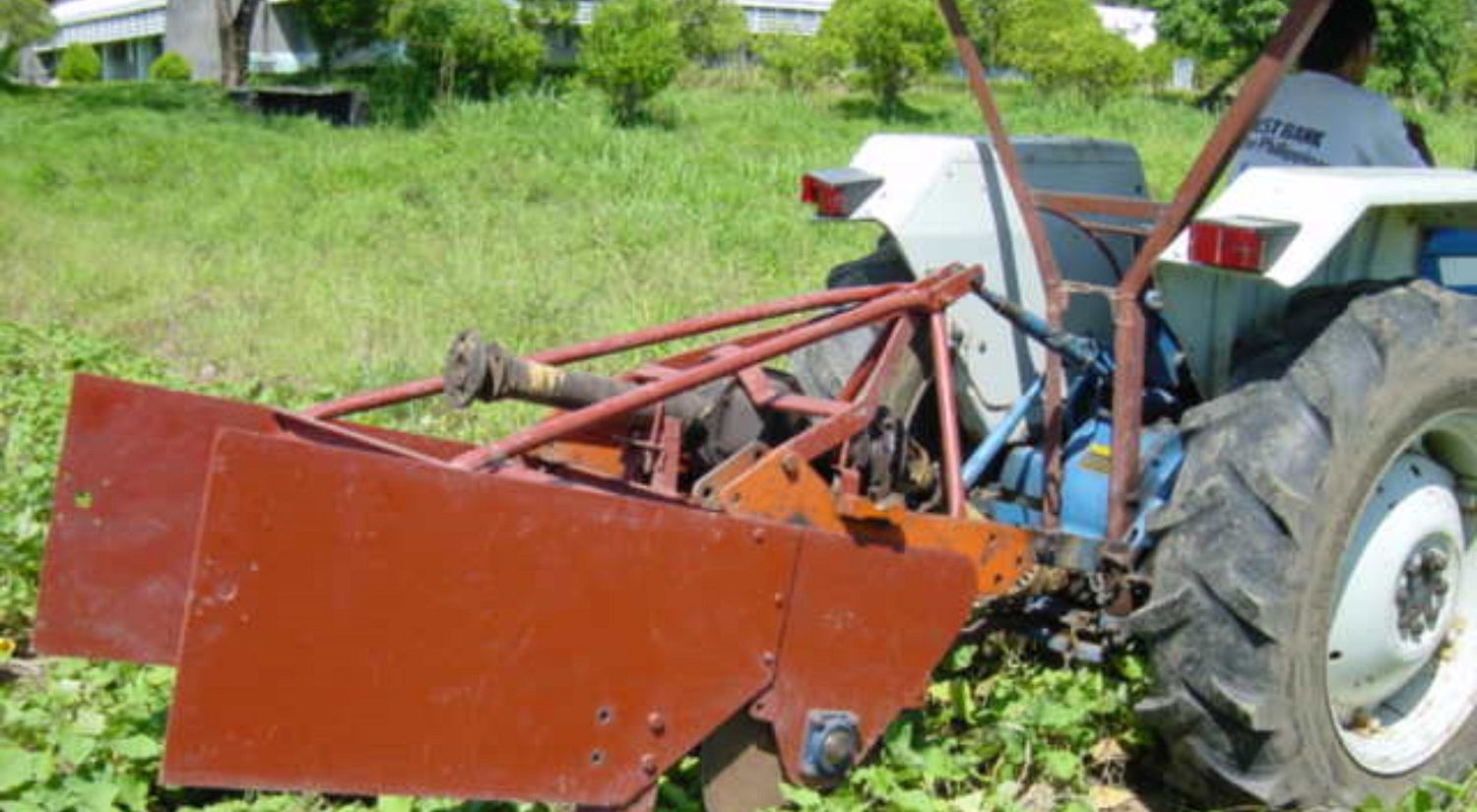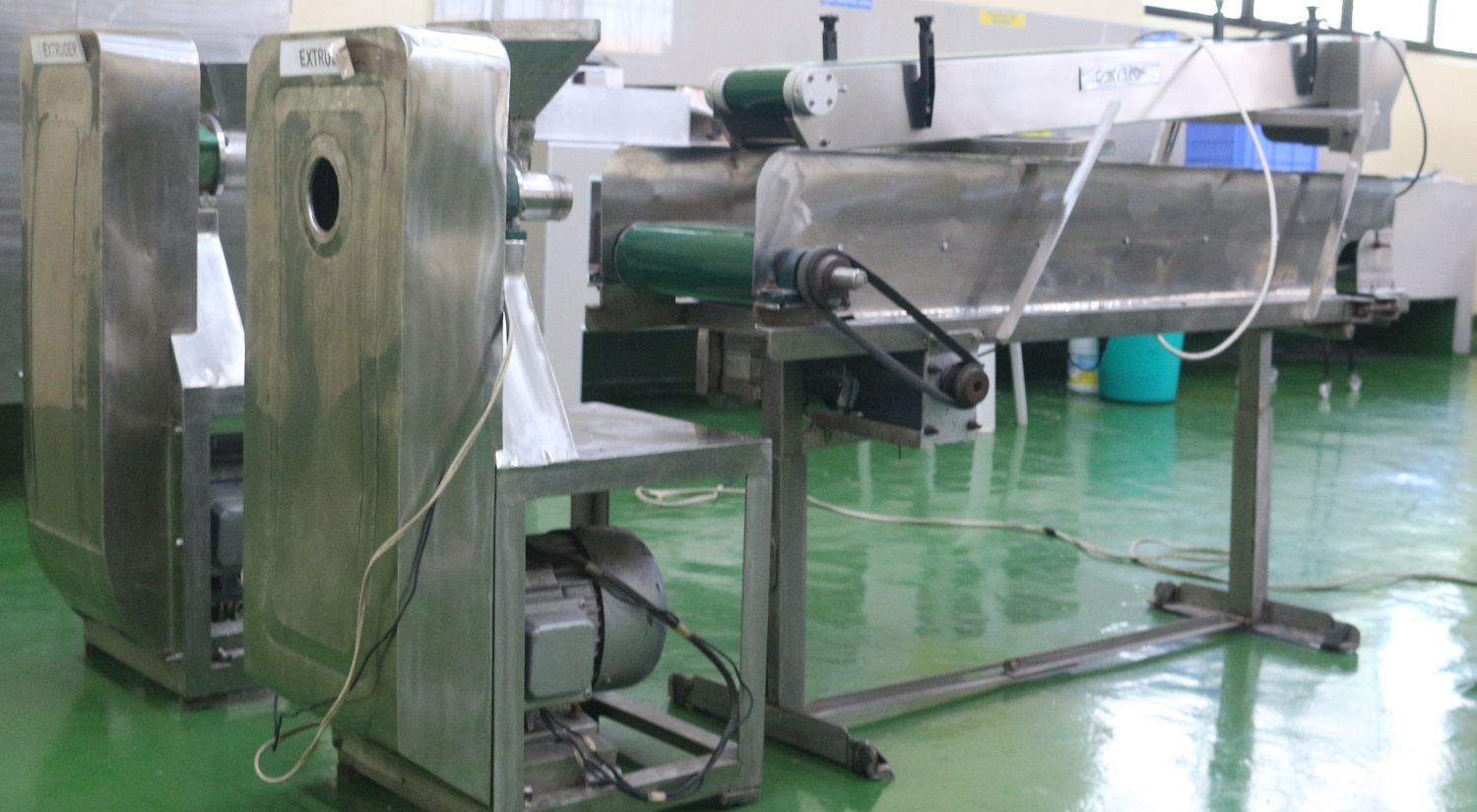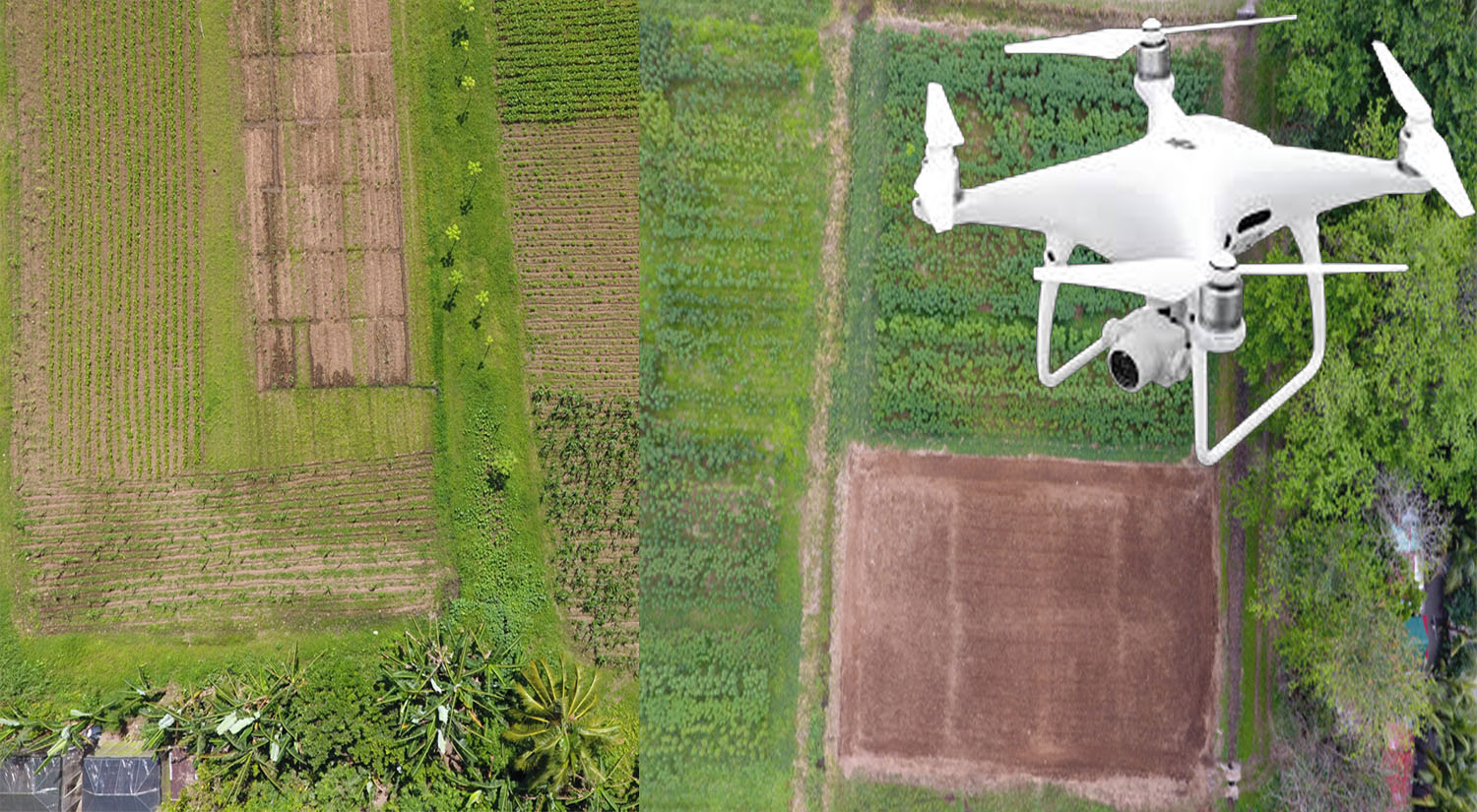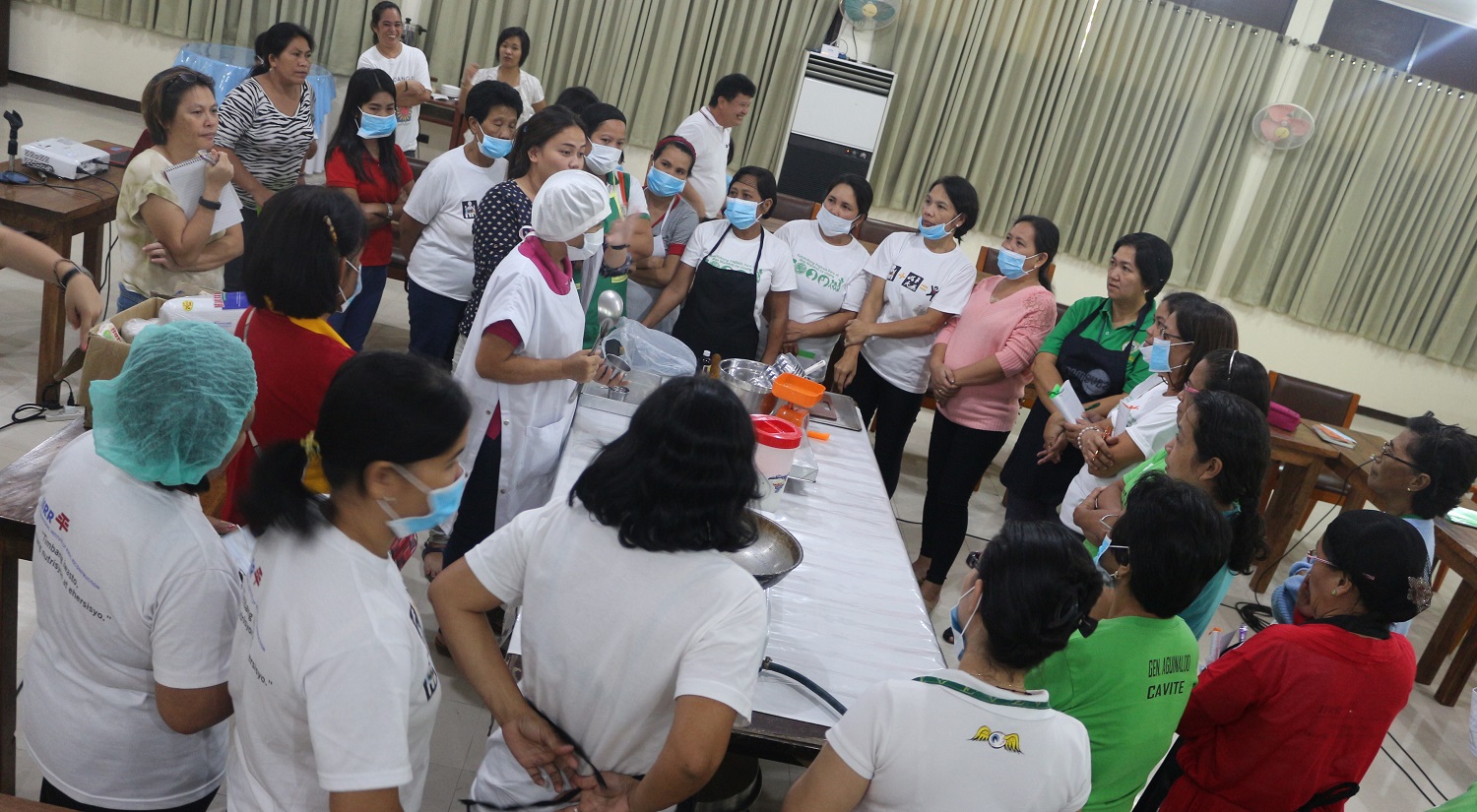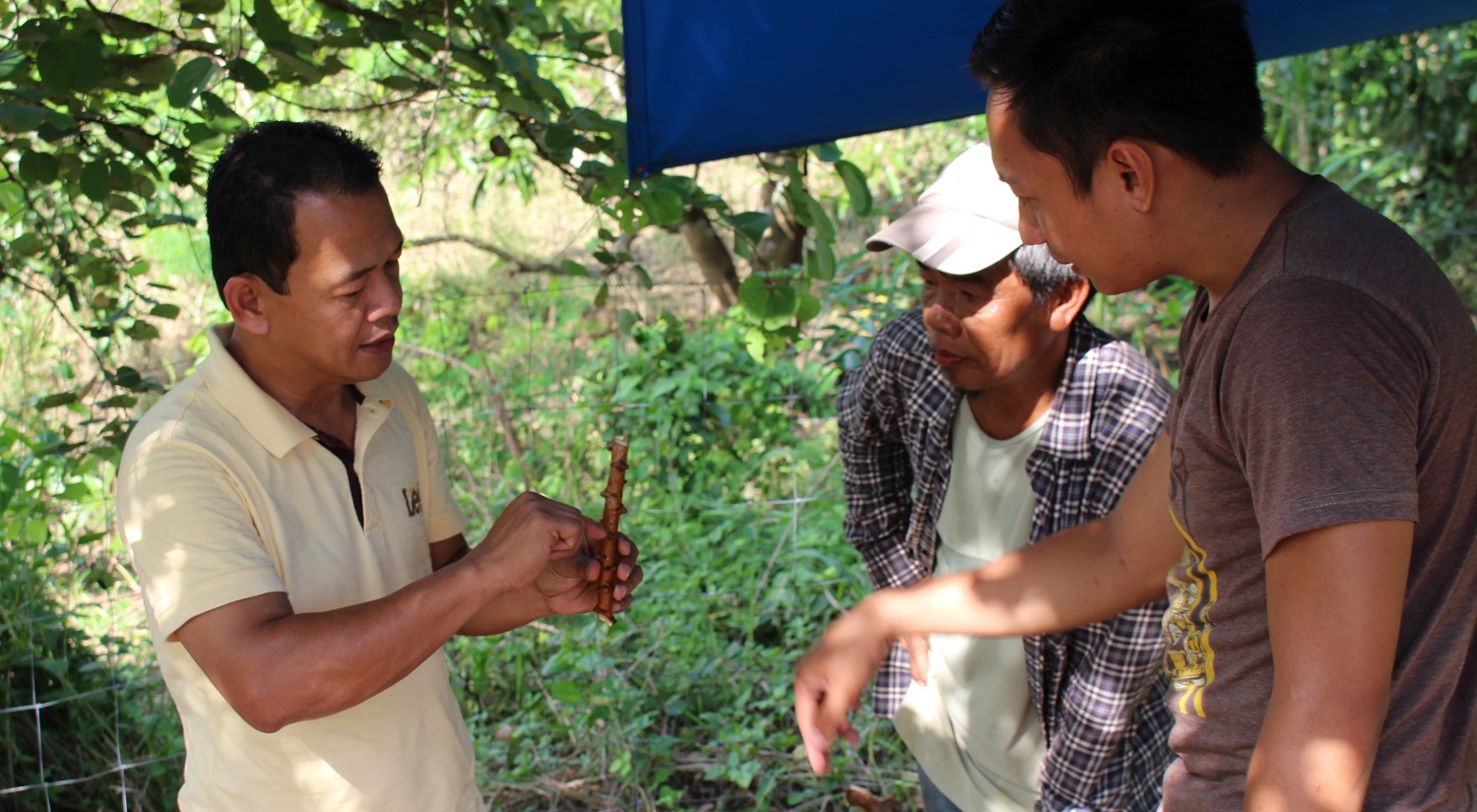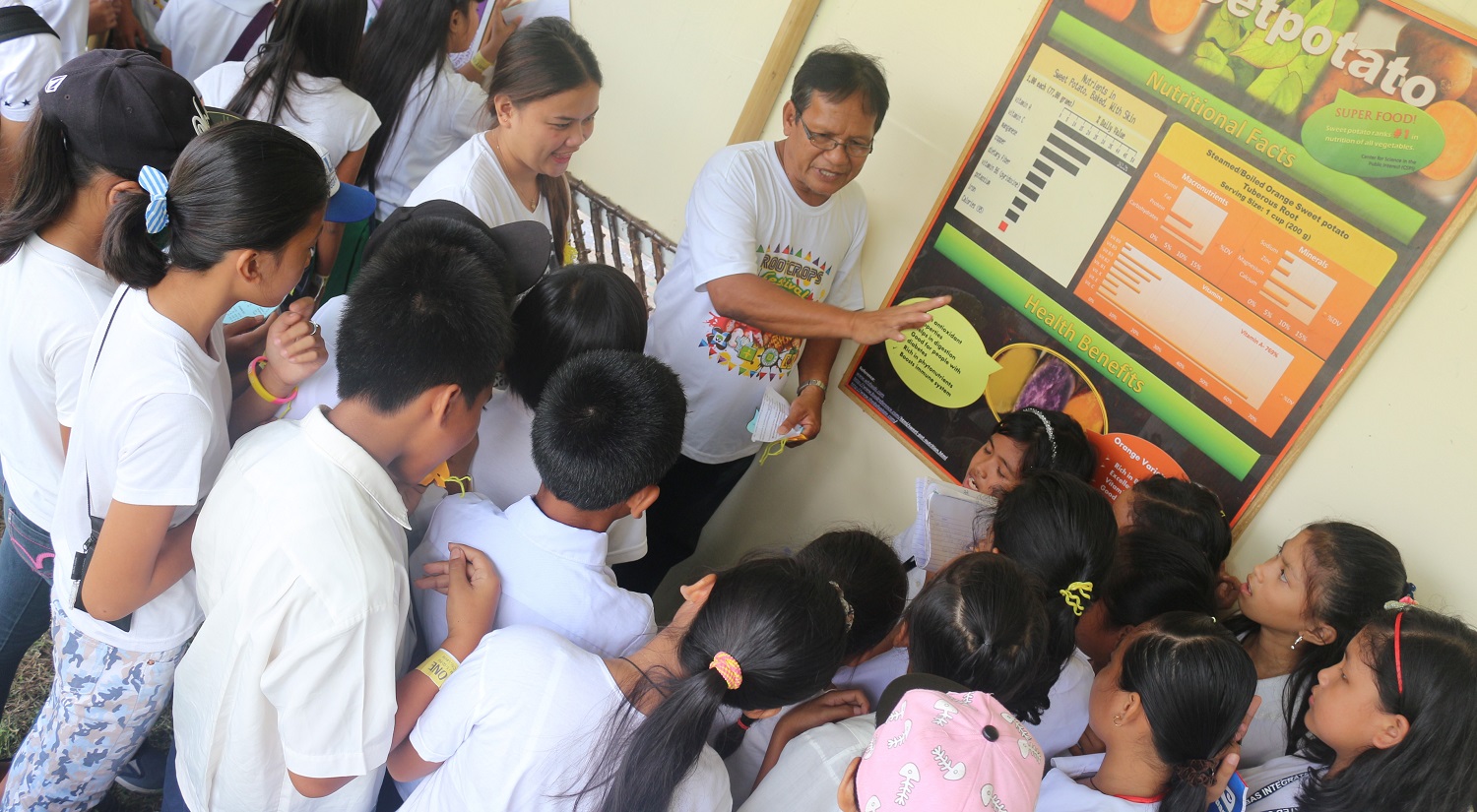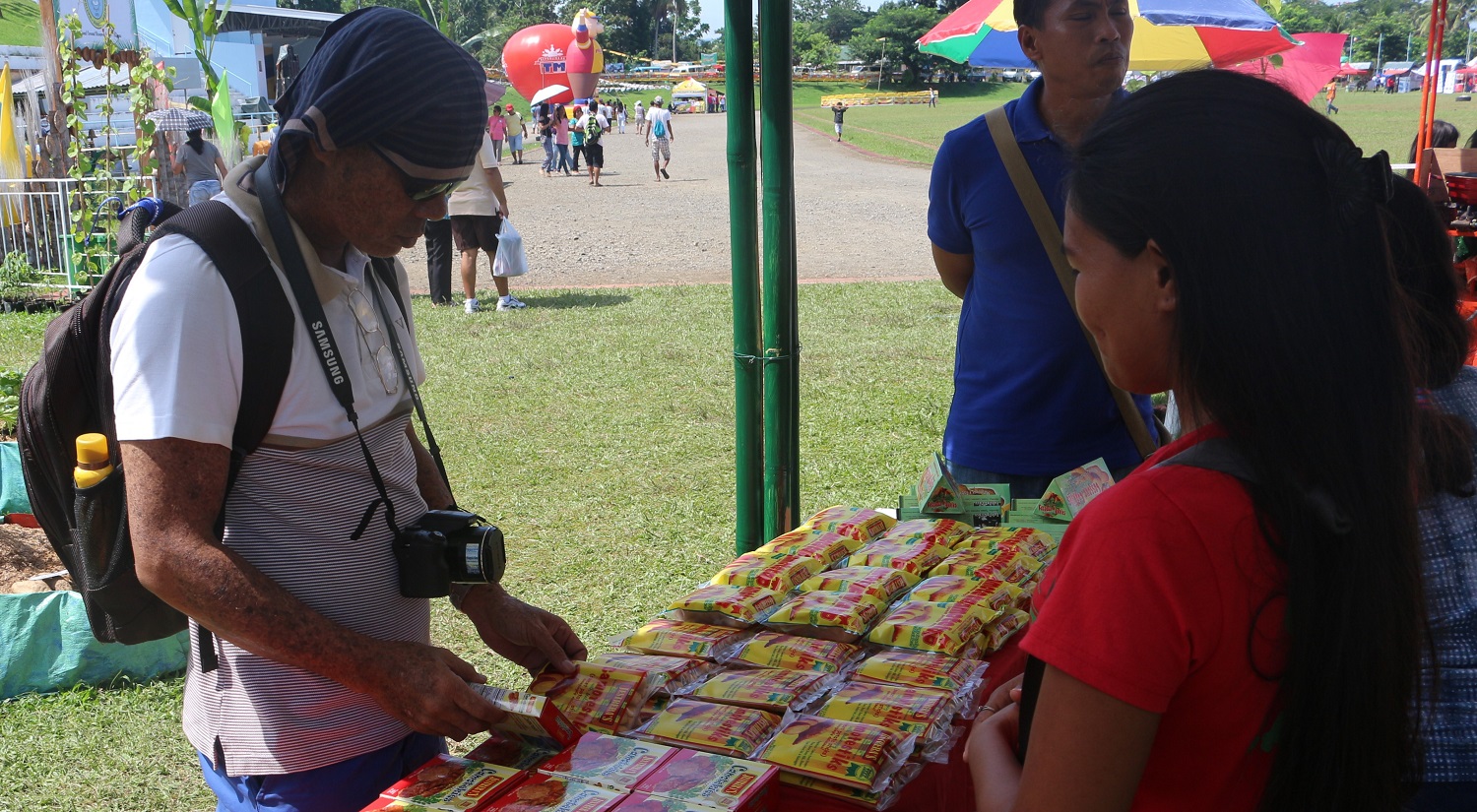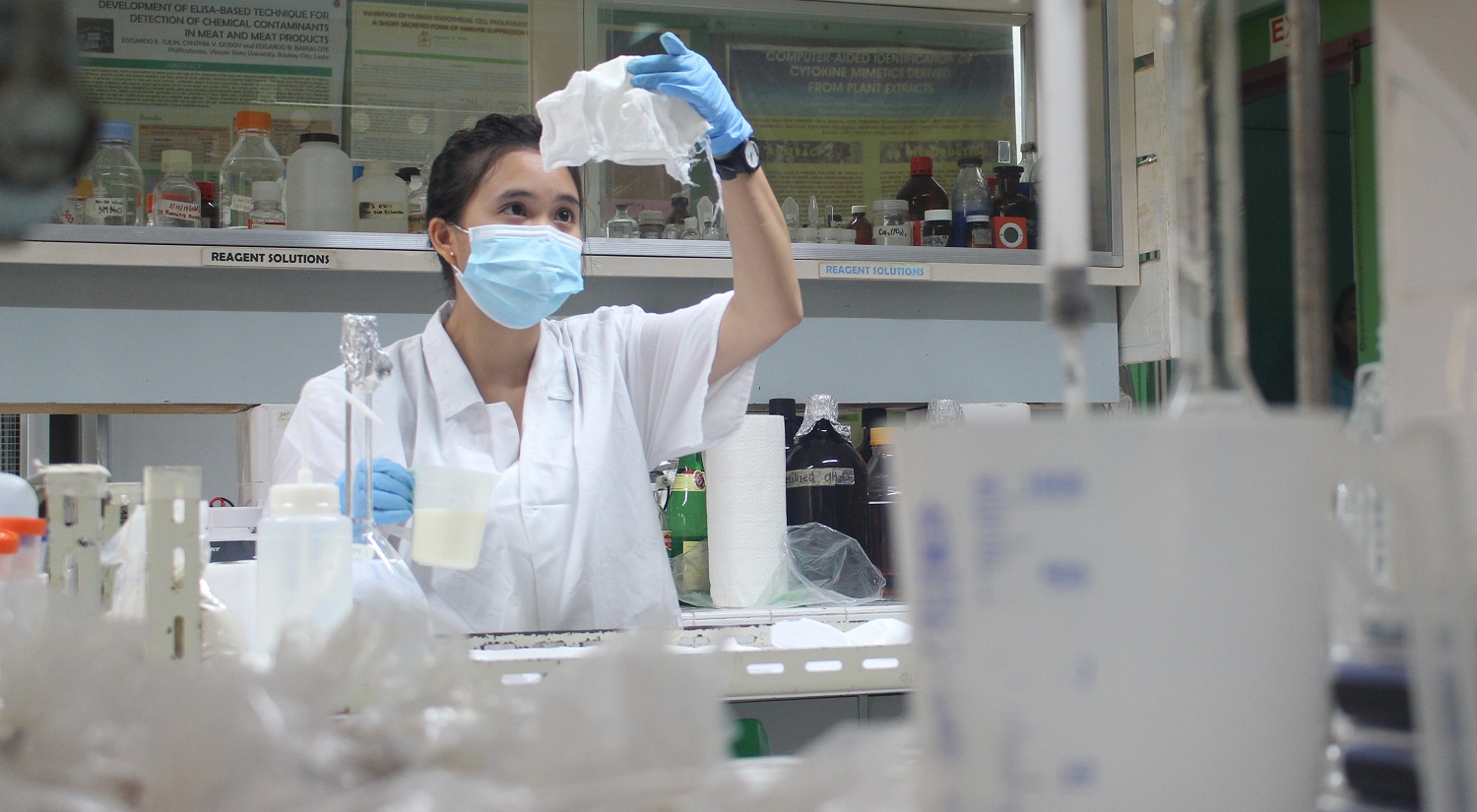In recognition of impeccable dedication and commitment, we showcase the works of PhilRootcrops’ longest serving farmer in the center, Ricardo Jarofe A. Maranguit. Known to many as Tatay Opek, he has been in PhilRootcrops since 1986, marking almost 40 years of continuous service.
Tatay Opek’s journey in farming began way back when he was 5 years old. With his parents being farmers, he was exposed early on in many farming activities as this sustains their livelihood to make ends meet.
“Nag start ko og farming mga 5 years old pa ko. Sa una pa lang, sige na ko og saka sa bukid kay maluoy man ko nila nanay ug tatay. So kung rootcrops lang ang hisgutan, sige na ko og tanom ug exposed nako ani. Pero kinaaraan pa man to ilaha so ang imo mabuhat kay mo tabang og gona, tanom pero sa imo pag buhat ana di pa man ka maka huna-huna.”
Like a seed, his love for farming continued to spur as he reached adulthood, choosing Vocational Agriculture as his track in high school and taking up Bachelor of Science in Agriculture (BSA) major in Plant Protection specializing in Plant Pathology at the former Visayas College of Agriculture (VisCA, now known as VSU). He further emphasized that even though his life circumstances were tough, he enjoyed his classes back and kept showing up because of his professors, most notably Dr. Palomar, who served as his inspiration for gaining in depth knowledge in agriculture.
“Na inspire ko ato ni Dr. Palomar; bilib kaayo ko ato niya. Sa una wa man mi anang notebook-notebook, mangayo ra ko og scratch [paper]. Ganahan ko ni Dr. Palomar kay hanas mo tudlo ba. So inig tudlo niya, mo sud jud dayon sa ako utok kay more on discussion man gud siya. Ang na ganahan sad nako sa ako kurso ba kay mag hisgot og mga diseases. Hangtod sa na memorize na nako unsa nga mga klase sa sakit ug unsa nga organism.”
Life took an unexpected turn before he graduated, as he stepped up into becoming a father. With a new set of responsibilities, this is how his journey being in a research center institution began. He first worked in the Regional Coconut Research Center in 1985 where he was a messenger and then later on became a Research Aide facilitating a project on coconut seedlings. Later on, he moved to the Department of Plant Protection focusing on NCTs (National Cooperative Testing) on corn and lastly on PhilRootcrops as a Laboratory Technician where he cultures all the diseases found on root crops.
Being used to both on field and inside a laboratory, Tay Opek highlights how he feels comfortable being in both worlds. He points out how passion is important in being able to perform well and hone your craft.
“Ang pagkahimo na ko ug Science Aide, tungod na kay ako man gud ang klase sa tao nga di mamili og trabaho. Kay maski man gud og nag eskwela ka, wala man tuod ko mag thesis, pero daghan na og terminal reports nga apil ko nga naghimo. Ang terminal report, di mana pwede basta-basta lang kay ang imo mana agi sa trabaho. Then, pag diha pa lang ko sa laboratory, sige na ko tanom og sweet potato. Tungod kay ang tanan, usa pa na mahimo nga usa ka variety, e-testing mana namo sa iya resistance to sweet potato scab ug resistance to weevil.
[Kini tanan], dili man lisod labaw na ug love nimo ang work. Kung love jud nimo ang work no, maka appreciate ka ug dapat jud ganahan ka sa imo buhat.”
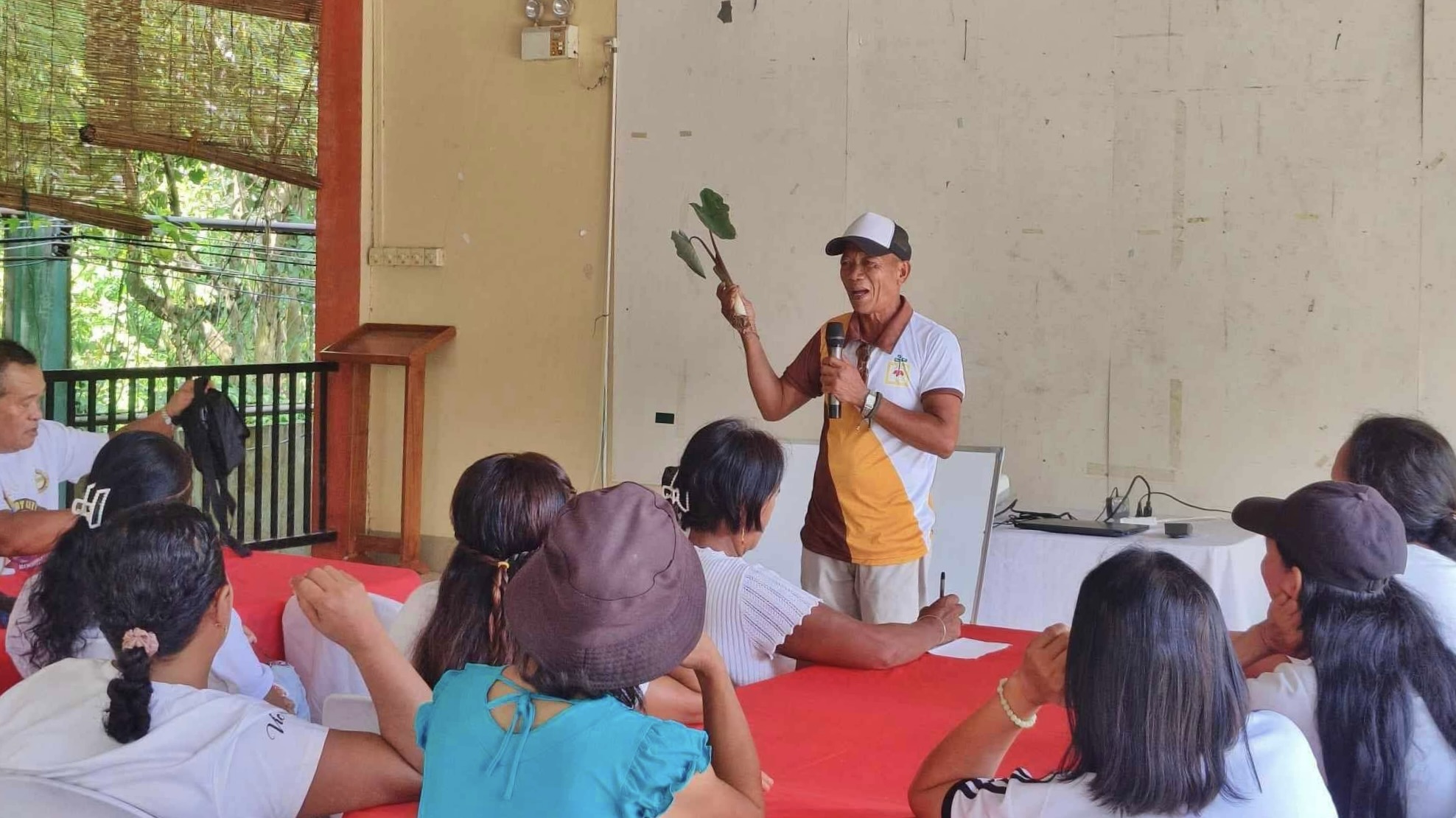
With agriculture shifting towards sustainable goals and development, Tay Opek stresses the importance of research in farming. He hopes that more people will be inclined to do more study and exploration of crops regardless of how small it may be for further progress and innovation.
“Gi love sad nako kay ganahan man sad ko makat-on og new innovation; kanang di ka magkinahanglan og funding pa para makahimo ka ini nga research. So kung naa kay ganahan, maghimo ka og imo kaugalingon nga research para sad naay madugang sa mga NCT. Kay ang NCT, mao na ang breaking ground sa pag himo sa production sa kamote ug uban pa na root crops. Sa [eng-ani na paagi] gi combine na nato ang traditional ug innovative farming.”
Being in PhilRootcrops for so many years and being one of the facilitators on many projects and trainings; his work in extension reaching different parts of the country, Tay Opek expresses how his work has not only made an impact towards students but extends towards farmers and even those who are in higher positions. The importance of being able to carry knowledge that is not only limited with basic farming but rather being a hands-on moderator while overseeing each step in order for his students to bring out their best potential and learnings.
The gratitude of the people that he helped and taught is the best payback he received.
“Ang nindot sad nga interaction kay kanang mo adto ka sa mag-uuma inig ting harvest nila kay dira man nimo mahibaw-an kung unsa imo gi tudlo, kung na apply ba nila. Nindot sad makabati nga naa mu-engon nga, “amo balay na extensionan tungod sa kamote”. Usa ni sa mga best reward, kanang naay positive [impact] ba.
Bisag unsa [siya] ka kwartahan sa kinabuhi, og mahimo na [siya] nimo nga matudluan. Mahatag nimo tanan nimo idea didto niya, unya kanang naglingkod ra ka, mukalit ra og engon nga, “salamat, ako gyud to na mauhan tong imong gi tudlo.” Mao nay lami kaayo sa paminaw.”
The lack of funding and government support were among the common challenges in the fields of research, extension, and development. This not only poses the risk of a project being stalled—or worse, left unfinished—but also threatens workers like Tay Opek with a potential loss of income.
“Usa sa mga challenges kay lack of funds. Hatagan ra ka og budget like 300,000 thousand, unya duha imo laborer unya ikaw, unsaon nimo pag palit og abuno? Sanglit mudiskarte gyud ta sa uban RA nga adunay daghan pondo nga abono. Ikaduha, wala gyud nang atong gi ingun nga government. Supporta nga klaro para sa mga farmers, dili tong klase sa support nga igo rata hatagan og kwarta para ipalit nimo og abono. Apil napud nang saying nga, “teach a man how to catch fish”. Dili pwede nga taman sa pang abono ra ang support.”
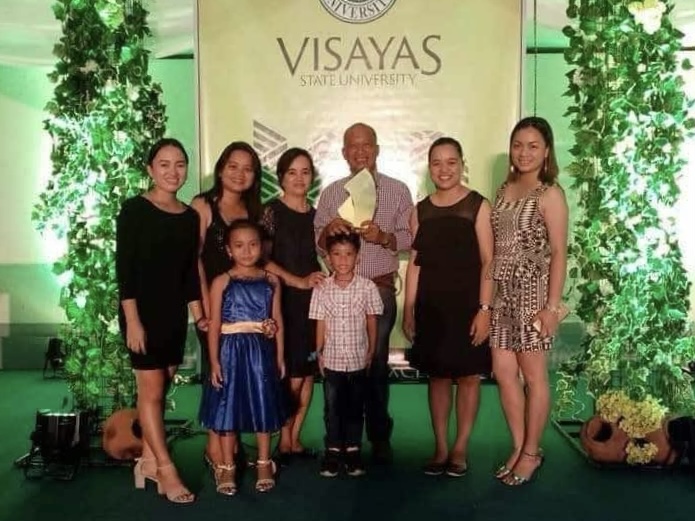
Looking back on his career, Tay Opek says he has no regrets about not finishing his degree. However, he emphasizes that regardless of his outlook, education remains important and he passes on that value towards his children.
“Walay pagbasol, pero importante jud ang pag eskwela. Ako mga anak, sila tanan puros na nakahuman, ug na awardee mi, family award gikan sa VSU. Mao to ako pinaka lami nga award [na nadawat] kay family award man sya.”
He adds how he passed down his passion for farming and teaching as his four children are graduates of Agriculture and Education based courses- them, now being professionals in their own field. He proudly shares that it was through farming, particularly rootcrops, that he was able to rally his children’s studies.
“Tanan nako anak nahuman na og eskwela. Usa ka rason kay mahitungod sa akong pag farm, pagpananom. So di tinuod nga way kwarta sa farming, naa jud.”
As he turned 64, Tatay Opek does not have any plans on retiring. He emphasizes that he still wants to work as long as he still given a job in the center. He credits his healthy and strong body on rootcrops and his nature of work that he sees not only as for supplying monetary needs but also for exercise. Additionally, he shares how he still wants to teach and impart more learning especially towards the younger generation in order for them to carry out and grow bigger and better crops.
“Sus! Ingon pa sa usa ka presidente sa una nga basta baskog pa, pwede pa man jud mo trabaho. [Kini] tungod ni sa kamote. Nag 64 nako niadtong March 25. Sa una pa lang tig kaon naman gud mi. Mao nang karon, wa gihapon ko mga gi pang bati sa lawas. Di pa sad ko ganahan mo undang kay mura og wala pa gyud nako mahatag ako knowledge sa mga batan-on kay kargado sa ako [mga na train] kay mga farmers man nga edaran na.”
Tatay Opek’s journey in PhilRootcrops is a story full of growth, dedication and hardwork. From humble beginnings, what started as a simple hope to provide for his family has now grown into a continuous pursuit of knowledge and innovation that can be shared towards farmers and communities. More than just improved harvests, Tatay Opek has cultivated a legacy that is strengthened by passion and empowerment bearing fruits of opportunities that serves as an inspiration towards many more generations to come.


